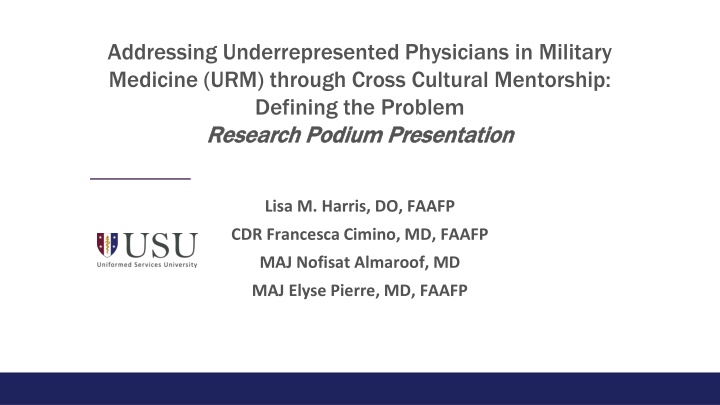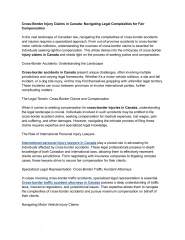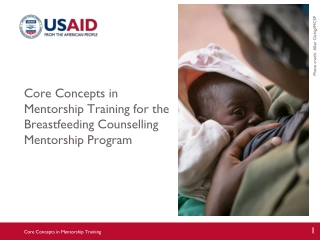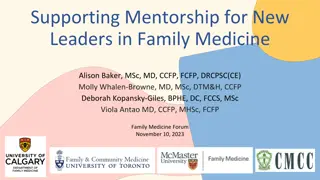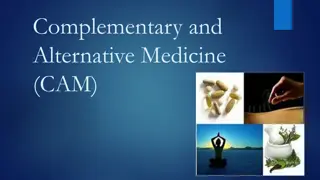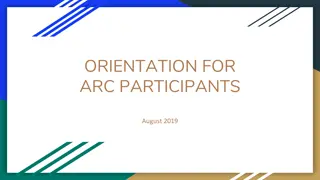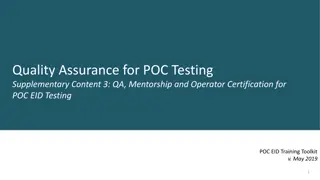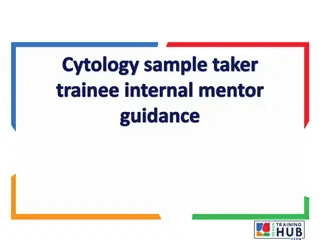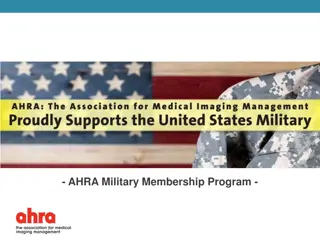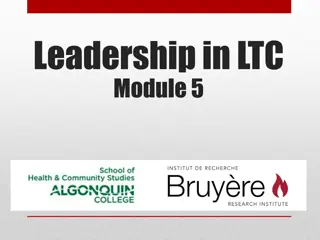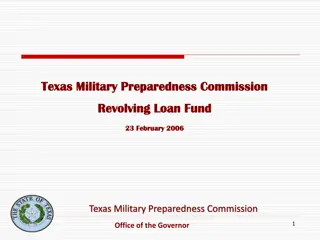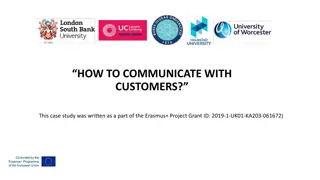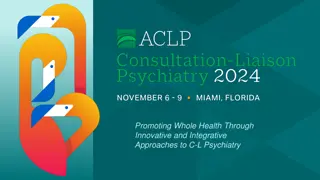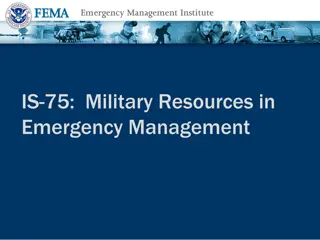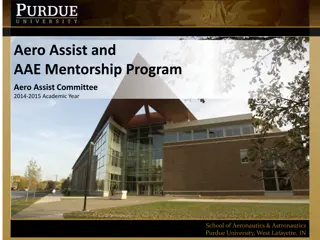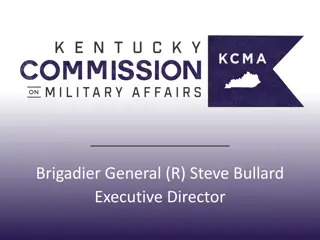Cross-Cultural Mentorship in Military Medicine
Addressing underrepresentation of physicians through mentorship with a focus on URM, exploring challenges and promoting diversity in military medicine.
Download Presentation

Please find below an Image/Link to download the presentation.
The content on the website is provided AS IS for your information and personal use only. It may not be sold, licensed, or shared on other websites without obtaining consent from the author.If you encounter any issues during the download, it is possible that the publisher has removed the file from their server.
You are allowed to download the files provided on this website for personal or commercial use, subject to the condition that they are used lawfully. All files are the property of their respective owners.
The content on the website is provided AS IS for your information and personal use only. It may not be sold, licensed, or shared on other websites without obtaining consent from the author.
E N D
Presentation Transcript
Addressing Underrepresented Physicians in Military Medicine (URM) through Cross Cultural Mentorship: Defining the Problem Research Podium Presentation Research Podium Presentation Lisa M. Harris, DO, FAAFP CDR Francesca Cimino, MD, FAAFP MAJ Nofisat Almaroof, MD MAJ Elyse Pierre, MD, FAAFP
Disclosures The opinions and assertions expressed herein are those of the author(s) and do not necessarily reflect the official policy or position of the Uniformed Services University or the Department of Defense. 2
Background Underrepresented in Medicine (URM/URiM): racial/ethnic groups that are in the medical profession in less numbers/percentage relative to their numbers in the general population Black/African American, Latinx/Hispanics, Native Americans (American Indians, Alaska Natives, and Native Hawaiians), and mainland Puerto Rican 11% of physicians are from minority groups that collectively represent 31% of the United States population. Among academic medicine faculty, 7-8% of physicians are from these minority groups. URM physicians experience academic promotion and leadership disparities. AAMC, accessed 2020 US Census, accessed 2020
Background - Minority Taxes Extra responsibilities placed on minority faculty in the name of efforts to achieve diversity Campbell, Academic Medicine, 2019 Jacobs, Family Medicine, 2020 Majority Subsidy
Background - Mentorship Mentorship is critical to physician recruitment, career development, and retention. Mentors focus on building skills to navigate career and aid in the complex socio-cultural process of professional identity formation. Advise Support Share knowledge Effective mentorship relationships require trust, personal connection, and commitment. Krishna, BMC Medical Education, 2019
Objectives 1) Obtain information on the current demographics, underrepresented in medicine physician collaboration, academic promotion, and leadership experience among U.S. military family physicians. 1) Assess the confidence and skills of military family physicians in discussing structural, systemic, and/or interpersonal racism in mentorship relationships with those underrepresented in military medicine. 1) Identify whether military family physicians could recognize and address specific challenges described in literature as minority taxes experienced by those underrepresented in medicine.
Method Design and Setting: Cross-sectional study using voluntary, anonymous data from the 2021 Uniformed Services Academy of Family Physicians (USAFP) Annual Meeting Omnibus Survey Study Population: USAFP Members attending 2021 Virtual Annual Meeting Data analysis: Descriptive statistics and chi-square tests The project was approved by the Uniformed Services University of Health Sciences Institutional Review Board in March 2016, and was re-approved as an Exempt protocol in March 2020.
Results 502 USAFP members attended USAFP 2021 Virtual Conference. 487 were eligible to participate in survey. Response rate was 52.9%, n= 258 using the Survey Monkey system. 45.7% (n=118) female and 54.3% (n=140) male. 77% of respondents identified as white. 10% of respondents identified as underrepresented in medicine (URM). Each branch of service and rank was represented.
Results: Mentorship, Skills, and Knowledge Most respondents feel they understand the historical context of racism (75.2%), have the skills to discuss racism (62.8%) and have the confidence to discuss racism (60.5%). 53% of the respondents do not have a URM physician mentee. 55% of the respondents have not collaborated with a URM physician colleague on a scholarly activity within the last 3 years. 54.7% feel they can recognize and address minority taxes. 22% have been affected by racism in their medical career.
Results: URM Physician Respondents More likely to have a URM physician mentee (65.4% vs 44.4%, p=0.042) More confident discussing racism (84.6% vs 60.3%, p=0.015) More likely to recognize and address minority taxes (84.6% vs 51.3%, p=0.001) Feel more skilled to discuss racism (80.8% vs 58.2%, p=0.026). 65% percent have been affected by racism in their medical career.
Results: Respondents with a URM Physician Mentee More confident discussing racism (70% vs 56.5%, p=0.025) More likely to recognize and address minority taxes (62.5% vs 47.8%, p=0.018) More likely to have collaborated with a URM physician in the last 3 years (62.8% vs 28.3%, p=0.00) Feel more skilled to discuss racism (70.8% vs. 51.4%, p=0.001)
Discussion: Minority Taxes Most respondents reported they understand the historical context of racism, have the skills to discuss racism, and confidence to discuss racism. Only approximately 50% could recognize and address minority taxes. There were statistically significant findings in URM physicians respondents and in those who reported having a URM physician mentee. More skilled and confident in discussing racism with URM physicians. More likely to recognize and address minority taxes. More affected by racism.
Discussion: Scholarly Activity Over half of respondents had not collaborated with a URM physician colleague on a scholarly activity within the last 3 years. Overall, mentors who have mentored a URM physician in the last 3 years had a statistically significant impact in scholarly activity collaboration with URM physicians. However, URM physicians mentors who mentored a URM physician did not have a statistically significant impact on scholarly activity collaboration.
Discussion: Cross Cultural Mentorship It is not always possible to have the same culture, race or ethnicity within mentorship dyads or groups. Mutually beneficial value in sharing different perspectives. Encouraging cross-cultural mentorship may: Decrease the effects of minority taxes among URM physicians. Increase the number of mentors and mentorship opportunities. Increase URM physician recruitment, career development, and retention.
Mentorship requirements Personal connection High level of commitment Trust Feedback Mutuality Krishna, BMC Medical Education, 2019
Campbell, Academic Medicine, 2019 Jacobs, Family Medicine, 2020
Discussion: Limitations Small sample size Demographics Added by the USAFP Clinical Investigation team Combined Asian, a non-URM physician group, and Pacific Islander, a URM physician group
Conclusion This initial study suggests that, while some URM physician mentorship is occurring, it could be improved. Faculty development, structured mentorship and sponsorship programs, and leadership curriculums can improve URM physician recruitment, career development, and retention by addressing skills to support cross-cultural mentorship relationships. Specifically, within URM mentorship relationships mentors must have the skills to recognize, address, and mitigate the negative effects minority taxes.
Conclusion Increasing diversity in among military family medicine physicians can assist in achieving health equity in military medicine. Additional studies are needed to: Identify URM mentorship implementation strategies in military medicine. Develop and implement programs. Improve transparency in military medicine regarding academic promotion and leadership. Identify opportunities to improve URM physician pathways in military medicine.
Addressing Underrepresented Physicians in Military Medicine (URM) through Cross Cultural Mentorship: Defining the Problem Research Podium Presentation Questions/Comments
